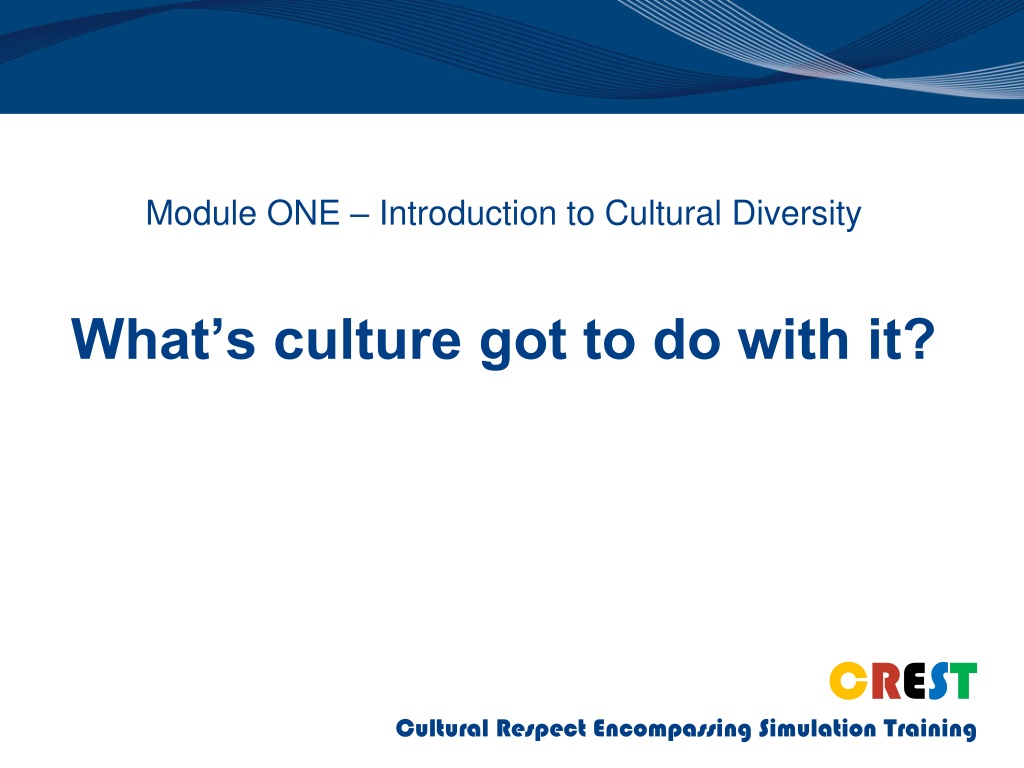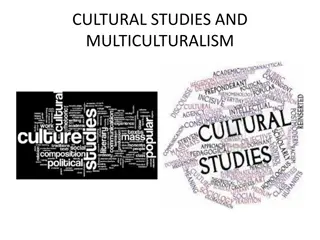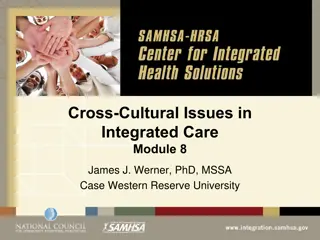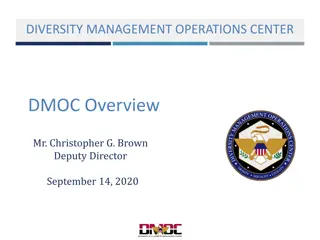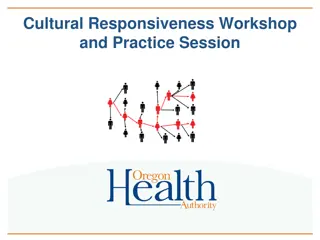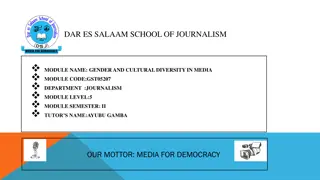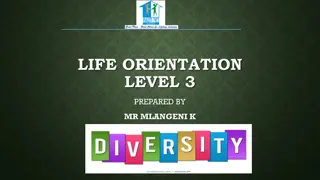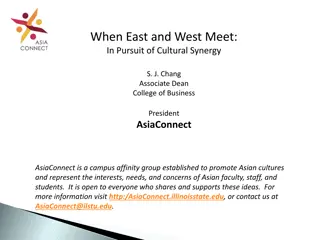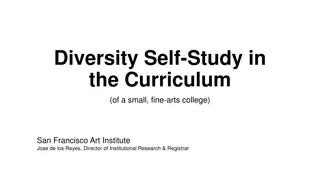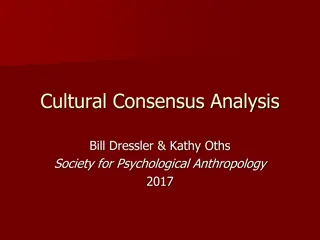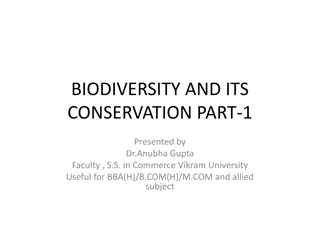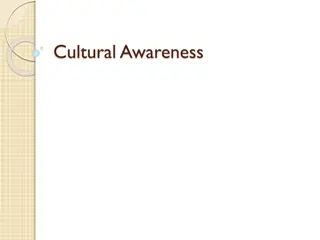Understanding Cultural Diversity in Healthcare Training
Delve into the significance of culture in healthcare, exploring its impact on health beliefs and communication. Discover the importance of cultural sensitivity and the complexities of negotiating between different health beliefs in diverse populations. Gain insights into the influence of cultural assumptions, stereotypes, and the Kleinman explanatory model of illness.
Download Presentation

Please find below an Image/Link to download the presentation.
The content on the website is provided AS IS for your information and personal use only. It may not be sold, licensed, or shared on other websites without obtaining consent from the author. Download presentation by click this link. If you encounter any issues during the download, it is possible that the publisher has removed the file from their server.
E N D
Presentation Transcript
Module ONE Introduction to Cultural Diversity What s culture got to do with it? CREST Cultural Respect Encompassing Simulation Training
CREST CREST Cultural Respect Encompassing Simulation Training
Outline of todays session 1. Overview of CREST and Module 1 2. Why is culture important? 3. Influence of culture on health beliefs 4. Kleinman s explanatory model of illness 5. Case Scenarios 6. Simulation CREST Cultural Respect Encompassing Simulation Training
Overview of CREST Four modules: Module 1 Introduction to Cultural Diversity Module 2 Negotiating between different health beliefs Module 3 Effective communication when English Proficiency is low Module 4 Communicating culturally sensitive issues CREST Cultural Respect Encompassing Simulation Training
Module 1 Aim To explore the interaction between culture and health, and the influence culture has on the identity and health beliefs of both patients and health care providers. CREST Cultural Respect Encompassing Simulation Training
Module 1 Primary Learning Objectives: Gain an understanding of how culture influences health and health beliefs; the health impacts of cultural assumptions and stereotyping; the rationale for cultural sensitivity; the meaning of culture and diversity within cultures including workplace or organisational cultures; and using the Kleinman's explanatory model of Illness. CREST Cultural Respect Encompassing Simulation Training
Why is culture important? Healthcare is not one-size-fits-all . There are many causes of health inequalities individual behaviours, provider knowledge and attitudes, organisation of the health care system, and societal and cultural values. Every ethnic group has its own perspectives and values; and many have health beliefs and practices that are different to those of traditional Western culture. CREST Cultural Respect Encompassing Simulation Training
Why is culture important? (contd) Many health care providers expect patients to conform to mainstream values. Such expectations create barriers which are further compounded by language and education differences between patients and providers from different backgrounds. It is important health care providers have a greater appreciation for cultural differences. CREST Cultural Respect Encompassing Simulation Training
Culture influences health beliefs All cultures have systems of health beliefs that explain what causes illness and how it can be cured or treated. Example Western societies see disease as a result of physical or chemical processes and advocate medical treatments. Some other societies believe that illness is the result of supernatural forces and believe in prayer or spiritual interventions. CREST Cultural Respect Encompassing Simulation Training
Illness is culturally shaped in the sense that how we perceive, experience, and cope with disease is based on our explanations of sickness, explanations specific to the social positions we occupy and systems of meaning we employ. Kleinman A., Eisenberg L., Good B. Culture, illness, and care: clinical lessons from anthropological and cross-cultural research. Ann Intern Med 1978;88:251 88. CREST Cultural Respect Encompassing Simulation Training
Culture can influence attitudes about medical care; ability to understand, manage, and cope with illness; ability to understand a diagnosis, and the consequences of medical treatment; roles and expectations of the patient, carer and family; how much information about illness and treatment is desired; how death and dying will be managed; bereavement patterns; processes for decision making; etc etc etc. CREST Cultural Respect Encompassing Simulation Training
Variations exist within cultures Cultures are influenced by geography, history, politics, etc. Beliefs and behaviours within the same culture are also shaped by experiences, circumstances and relationships While it is good to have a general understanding of different cultures, it is important to realise that there are varying beliefs and practices even within a culture. CREST Cultural Respect Encompassing Simulation Training
Asians values Honour of the family is extremely important. Extended family has significant influence; the oldest male is often the decision maker and spokesperson. Older family members are respected and their authority is often unquestioned. Strong emphasis on maintaining harmony, avoiding conflict and direct confrontation. Respect authority. CREST Cultural Respect Encompassing Simulation Training
Asians health belief and behaviours Health is viewed as the result of a harmonious balance between the poles of cold and hot, that govern bodily functions. Avoid disagreement with health care providers. BUT, lack of disagreement does not necessarily mean agreement. Reluctance to discuss mental health issues because it indicates a lack of self-control, shame ( lose face ) and guilt. CREST Cultural Respect Encompassing Simulation Training
Asians health belief and behaviours (contd) Vietnamese mystical beliefs explain physical and mental illness; do not readily accept Western mental health counselling and interventions, particularly when self-disclosure is expected. Indians reluctant to accept diagnosis of emotional illness or mental retardation because it severely reduces the chances of other members of the family getting married. CREST Cultural Respect Encompassing Simulation Training
Muslims values Qadr or destiny Muslims believe that after one has done everything possible, if circumstances do not lead to a desired outcome, then that outcome was not ordained by God who knows best about all things. Practises Ramadan fasting to purify the soul, refocus attention on God, and practice self-sacrifice. Some Muslims are not comfortable shaking hands with a member of the opposite sex. Modesty is very important to Muslims. CREST Cultural Respect Encompassing Simulation Training
Muslims health belief and behaviours Primary influence on health care beliefs and behaviours is the role of God in illness and recovery. Many Muslims prefer a same-sex provider, and will be comfortable undressing or uncovering only the part of the body currently being examined. Imams play a big role in healing; they are often consulted for advice during illness. CREST Cultural Respect Encompassing Simulation Training
Explanatory Models Explanatory models are notions that patients, families and practitioners have about a specific illness episode. These informal descriptions of what an illness is about have enormous clinical significance; to ignore them may be fatal. Kleinman, A. Conflicting Explanatory Models in the Care of the Chronically Ill (Cahpter 7). In: The Illness Narratives: Suffering, Healing and the Human Condition. 1988. Basic Books, New York. CREST Cultural Respect Encompassing Simulation Training
Kleinmans Explanatory Model Eliciting the patient s (explanatory) model gives the physician knowledge of the beliefs the patient holds about his illness, the personal and social meaning he attaches to his disorder, his expectations about what will happen to him and what the doctor will do, and his own therapeutic goals. CREST Cultural Respect Encompassing Simulation Training
Kleinmans Explanatory Model (contd) What do you think has caused your problem? Why do you think it started when it did? What do you think your sickness does to you? How does it work? How severe is your sickness? Will it have a short or long course? What kind of treatment do you think you should receive? What are the most important results you hope to receive from this treatment? What are the chief problems your sickness has caused for you? What do you fear most about your sickness? CREST Cultural Respect Encompassing Simulation Training
Lets consider 4 case studies CREST Cultural Respect Encompassing Simulation Training
Case Study 1 Jane (a rehab nurse): I was looking after a Japanese man in his 60s following a stroke. His left side was extremely weak and he had to relearn to feed himself, dress, shave, use the bathroom and perform other daily activities. I spent a lot of time carefully explaining to him how to do these tasks, but he listened only passively. He simply refused to do anything for himself and continually barked commands at me. When his wife was around, he demanded that she does everything for him. He was discharged after four weeks almost as dependent as when he first arrived. It was so frustrating! Tanakan-san (Jane s patient): In our culture, family loyalty and interdependence are extremely important. When I am sick, I expect my wife to look after me. Just like my wife knows I will look after her when she is sick. CREST Cultural Respect Encompassing Simulation Training
Case Study 2 A 37-year-old woman with two children was admitted to the hospital following a car accident. Her medical records identified her as a Jehovah's Witness and stated that under no circumstances was she to receive blood. The ED doctor, however, felt compelled to save lives and gave her a blood transfusion. His actions saved the patient's life, but she was not grateful and sued him for assault and battery, winning a $20,000 settlement. CREST Cultural Respect Encompassing Simulation Training
Case Study 3 Tina (originally from Malaysia): I had a Fijian patient once. While I was examining her eyes, she abruptly stood up, excused herself and left. I m not certain what happened! Lela (originally from Fiji): I was shocked when the doctor placed her hand on my head! In my culture, we don t touch people on the head. And not just that if we walk into a room and there are people sitting on the floor, we always excuse ourselves and stoop a bit as we walk past them so we re not towering so much over them. We also avoid reaching near their head for something. CREST Cultural Respect Encompassing Simulation Training
Case Study 4 An Arabic man refused to let a male lab technician enter his wife's room to draw blood following the birth of their child. When the nurse finally convinced him of the need, he reluctantly allowed the technician in the room, but not until he made sure that his wife was completely covered. Only her arm stuck out from beneath the blankets, and he watched the technician intently throughout the procedure. For Arabic people, family honour is one of the highest values. Since family honour is tied to female purity, extreme modesty and sexual segregation must be maintained at all times. CREST Cultural Respect Encompassing Simulation Training
General Tips on Effective Communication Culturally sensitive an attitude of openness and acceptance Remain non-judgmental Pay close attention to body language, responses and expressions. Learn to listen and ask patients and carers open- ended questions to gain more information Involve families of patients and other health providers CREST Cultural Respect Encompassing Simulation Training
